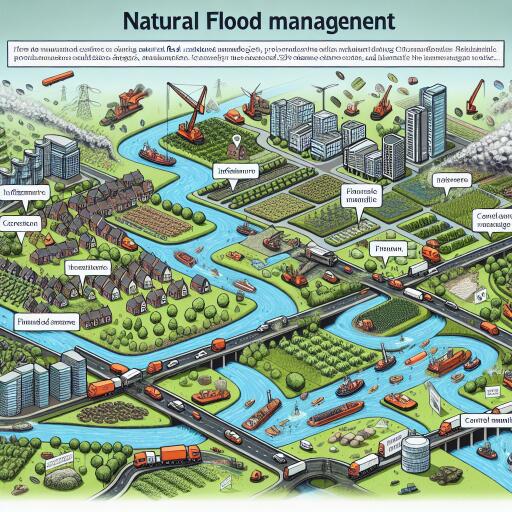
Unprecedented £25m Funding Boost to Enhance England’s Flood Defences Through Nature
In a landmark move signalling a shift towards eco-friendly flood defence mechanisms, the UK government has earmarked an unprecedented £25 million for the development of 40 innovative natural flood management projects across England. This substantial investment, scheduled for disbursement by the Environment Agency by March 2027, marks a significant step forward in utilizing natural resources to bolster flood resilience while simultaneously nurturing biodiversity.
The projects, carefully selected from a pool of proposals submitted by a diverse array of stakeholders including wildlife organizations, community cohorts, river trusts, and local governing bodies, aim to strategically employ natural terrains and ecosystems to mitigate flood risks. This approach not only promises enhanced flood protection but also pledges allegiance to the preservation and expansion of natural habitats.
The initiative follows closely on the heels of the government’s resolve to double its commitment to nature-based solutions for combating flooding and coastal erosion. The goal is to roll out 260 such projects over the span from 2021 to 2027, illustrating a robust blueprint for future flood defence strategies. Among the standout projects poised to receive funding is an ambitious scheme led by the Severn Rivers Trust which focuses on leveraging natural flood management techniques to revitalize the Illey Brook’s headwaters near Halesowen in the West Midlands. The plan includes augmenting soil and land management practices to retard and store surface runoff, coupled with the creation of expansive new woodland areas and hedgerows that bolster wetland complexes and facilitate new habitats.
Simultaneously, the Ribble Rivers Trust is set to implement a series of interventions aimed at reducing floodwater velocities and volumes within the Ribble catchment areas through the establishment of swales, ponds, and leaky barriers. These measures are complemented by strategic vegetation management and the planting of new woodlands designed to intercept and slow the downhill flow of water, thereby enhancing the capacity of soils to store water.
This funding initiative is a critical component of the National Flood and Coastal Erosion Risk Management Strategy for England, a visionary framework aiming to fortify protections for homes and businesses against escalating flood risks while fostering climate-resilient ecosystems. It resonates with the Government Policy Statement on Flood and Coastal Erosion Management’s advocacy for embracing the potent force of nature in flood mitigation efforts, and aligns with the Environmental Improvement Plan’s emphasis on employing nature-based solutions to adapt to and mitigate the impacts of climate change.
Alan Lovell, Chair of the Environment Agency, expressed enthusiasm over the surge in interest for natural flood management initiatives and acknowledged the transformative potential of these nature-based approaches. He highlighted the Environment Agency’s pivotal role in spearheading this pioneering programme and expressed eagerness to collaborate with partners to mainstream natural techniques in flood protection efforts.
Floods Minister Robbie Moore underscored the necessity of integrating nature into climate adaptation strategies to restore natural environments and safeguard communities. Moore hailed the £25m funding as a testament to the government’s commitment to amplifying flood resilience, enhancing biodiversity, and preserving ecosystems for future generations.
Mark Lloyd, Chief Executive of the Rivers Trust, welcomed the announcement as a bold step towards safeguarding communities from flooding while simultaneously creating spaces for nature, purifying pollutants, recharging groundwater aquifers, storing organic carbon, and elevating community amenity values.
The announcement builds upon the success of the government’s £15m natural flood management pilot programme which concluded in 2021. The programme was instrumental in creating water storage solutions equivalent to 1.6 million cubic meters and mitigating flood risks to an estimated 15,000 homes.
In light of recent extreme weather events, including the significant damages wrought by Storm Henk, the importance of investing in flood resilience has never been more pronounced. NFU Mutual’s initiative to encourage property owners to adopt flood resilience measures underscores the collective imperative to enhance the nation’s preparedness for future climatic adversities.
As the UK strides towards a greener, more sustainable future, the critical role of natural flood management in safeguarding our environment, communities, and biodiversity cannot be overstated. This transformative investment signifies a leap in the national strategy to combat flooding, heralding a new era of eco-conscious, effective flood defence mechanisms.





Leave a Reply